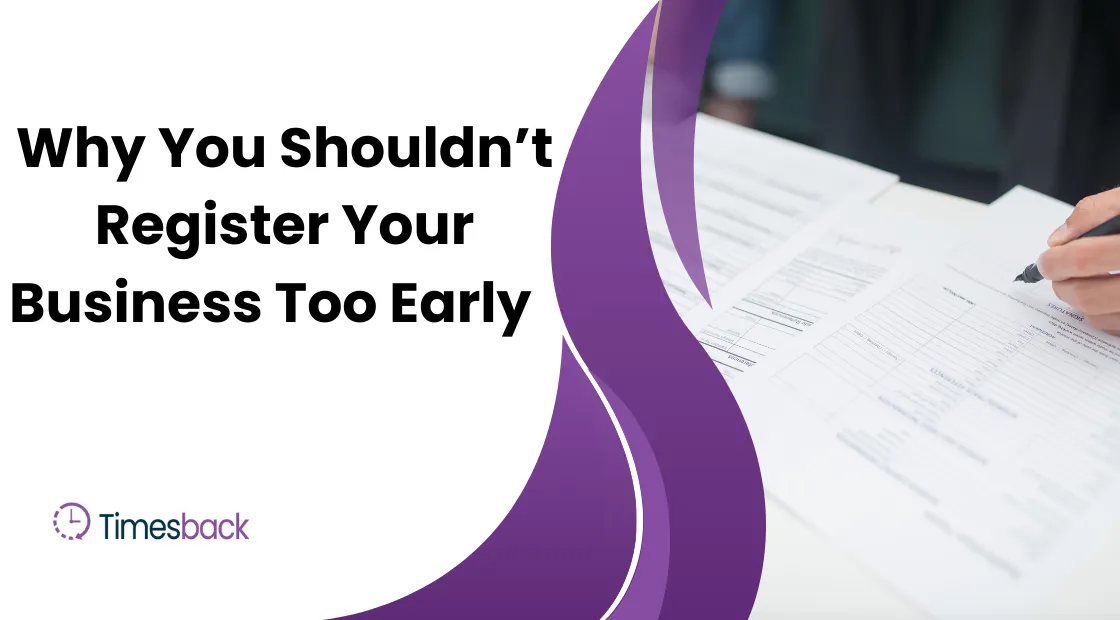Why You Shouldn’t Register Your Business Too Early

Deciding to register your business too early can feel like a leap toward legitimacy, but rushing this step often leads to costly missteps.
Anúncios
Launching a company is exhilarating—visions of growth, impact, and success swirl in your mind.
Yet, the urge to formalize your venture prematurely can lock you into commitments that stifle flexibility and drain resources.
This article explores why holding off on business registration until the right moment can be a smarter, more strategic move for entrepreneurs.
Anúncios
With practical insights, real-world examples, and data-driven reasoning, we’ll unpack the risks of hasty registration and offer a roadmap for timing it right.
As you contemplate your entrepreneurial journey, remember that patience can lead to a more solid foundation for your business.
Taking the time to validate your concept can save you from potential pitfalls and create a clearer path to success.
The Allure of Immediate Registration
Entrepreneurs are often eager to make their ventures official.
The idea of a registered business carries a sense of authority—a name, a structure, a legal identity.
It’s tempting to jump in, especially when you’re brimming with enthusiasm.
But what if this rush to formalize is more of a trap than a triumph?
Registering too soon can tie you to a business model that hasn’t been tested, saddle you with unnecessary costs, and limit your ability to pivot.
Let’s dive into why waiting can be the wiser choice.
The excitement of starting a business can cloud judgment, leading to decisions that may not align with long-term goals.
Taking a step back to evaluate your readiness can provide clarity and prevent hasty commitments.
The Risks of Premature Registration
Financial Burdens Before Validation
Starting a business is a gamble, and registering too early can amplify the stakes.
Filing fees, licenses, and compliance costs vary by state and business type, but they’re rarely cheap.
For instance, a 2023 Small Business Administration (SBA) report noted that initial registration and licensing fees for a small business in the U.S. can range from $50 to $1,500, depending on the state and structure.
Add ongoing expenses like taxes, permits, and legal fees, and you’re looking at a significant outlay before your idea has proven viable.
Consider Sarah, a budding entrepreneur who launched a boutique bakery.
Excited to make her dream official, she registered her business too early, securing an LLC and permits before testing her market.
Within months, she realized her niche—gluten-free pastries—wasn’t in demand locally.
The $2,000 spent on registration and compliance was a sunk cost, and pivoting to a new concept meant starting over.
Had she validated her idea through pop-up events or online sales first, she could have avoided this financial hit.
| Cost Type | Estimated Range (USD) | Notes |
|---|---|---|
| LLC Filing Fees | $50–$500 | Varies by state |
| Business Licenses | $20–$1,000 | Depends on industry and location |
| Annual Compliance Fees | $100–$500 | Ongoing costs for reporting, taxes |
Understanding the financial implications of premature registration is crucial.
By assessing your budget and potential expenses, you can make informed decisions that support your business's growth.
Locking Into an Unproven Model
When you register your business too early, you commit to a specific name, structure, and vision that may not withstand market realities.
A business name that feels perfect today might not resonate with customers tomorrow.
Similarly, choosing between an LLC, S-corp, or sole proprietorship requires clarity about your goals, revenue model, and tax strategy—details often unclear in the early stages.
Take the example of Mark, who launched a tech startup focused on AI-driven fitness apps.
He registered his business too early as an S-corp, anticipating rapid growth and investor interest.
But after market research, he pivoted to a subscription-based wellness platform.
The original business structure no longer fit, forcing him to dissolve the entity and re-register, costing time and $3,500 in legal fees.
Waiting to refine his concept could have saved him this hassle.
Choosing the right business structure is critical for long-term success.
Taking the time to research and understand your options can prevent costly mistakes down the road.
Loss of Flexibility
Entrepreneurship thrives on agility.
Early registration can anchor you to a specific location, tax obligations, or operational framework, making it harder to adapt.
For instance, registering in a state with high taxes or strict regulations can limit your ability to relocate or scale.
Waiting allows you to test your idea in different markets, tweak your offerings, and explore partnerships without legal entanglements.
An analogy helps here: Registering your business too early is like building a house before surveying the land.
You might pour the foundation only to discover the soil is unstable or the location floods.
By testing the ground—your market, customer demand, and operational needs—you ensure a stronger, more adaptable structure when you finally build.
Flexibility is essential in today’s fast-paced business environment.
Being able to pivot or adapt your strategy can make the difference between success and failure.
+ Angel Investors vs. Venture Capital: What’s the Difference?
The Benefits of Waiting
Validating Your Idea First
Before you register your business too early, validate your concept through market research, prototypes, or minimum viable products (MVPs).
This approach minimizes risk and maximizes learning.
According to a 2024 survey by CB Insights, 42% of startups fail because they misjudge market demand.
Testing your idea through pre-sales, focus groups, or beta launches can reveal whether your product or service resonates.
For example, instead of registering a catering company outright, try offering small-scale services at local events.
Use social media to gauge interest, collect feedback, and refine your menu.
This lean approach lets you pivot without the burden of legal or financial commitments.
Utilizing tools like surveys or social media polls can provide valuable insights into customer preferences.
This data-driven approach can guide your business decisions and increase your chances of success.

Preserving Resources
Delaying registration preserves cash flow for critical early-stage activities like product development or marketing.
Instead of spending on filing fees or legal consultations, you can invest in customer acquisition or prototyping.
This is especially crucial for bootstrapped entrepreneurs who rely on limited personal funds.
By waiting, you allocate resources where they matter most—building a product customers love.
Investing in customer feedback and product testing can yield higher returns than early registration costs.
Focusing on your core offering first allows you to create a solid foundation for your business.
Maintaining Strategic Flexibility
Waiting to register keeps your options open.
You can experiment with different business names, test multiple revenue streams, or explore partnerships without legal constraints.
This flexibility is vital in fast-moving industries like tech or e-commerce, where trends shift rapidly.
For instance, a freelancer testing a side hustle can operate under their personal name until they’re ready to scale, avoiding premature costs and commitments.
| Stage | Action Before Registration | Benefit |
|---|---|---|
| Ideation | Conduct market research | Confirms demand |
| Testing | Launch MVP or pilot | Gathers real-world feedback |
| Refinement | Tweak business model | Aligns with market needs |
Maintaining flexibility allows you to adapt your business model as you gather insights.
This adaptability can be a significant advantage in a competitive marketplace.
When to Register: Timing It Right
So, when should you register?
The answer depends on your business’s stage and goals, but key indicators signal readiness.
First, ensure you have a validated product or service with consistent demand.
This might mean a steady stream of pre-orders, positive customer feedback, or a growing waitlist.
Second, confirm your business model—know your target market, pricing, and revenue streams.
Finally, assess legal needs.
If you’re signing contracts, hiring employees, or seeking investors, registration becomes essential to protect your interests.
A practical timeline might look like this: Spend 3–6 months testing your idea, refining your model, and building a customer base.
Once you’re generating revenue or attracting serious interest, consult a legal or financial advisor to choose the right structure and file.
This approach balances caution with momentum, ensuring you’re not jumping the gun.
Consulting resources like the Small Business Administration can provide valuable guidance on when and how to register your business.
Their wealth of information can help you navigate the complexities of starting a business.
Legal and Tax Considerations
Registering too early can also complicate your tax strategy.
Different business structures—sole proprietorship, LLC, corporation—carry distinct tax implications.
For instance, an LLC offers pass-through taxation, while a C-corp faces double taxation.
Choosing the wrong structure before understanding your revenue model can lead to unexpected tax burdens.
Consulting a CPA or tax professional before registering helps align your structure with your financial goals.
Moreover, some businesses don’t need immediate registration.
Freelancers or solopreneurs can often operate under their personal name and Social Security Number until they scale.
This avoids unnecessary costs while you test the waters.
Understanding the tax implications of your business structure is essential for long-term financial health.
Taking the time to consult with professionals can save you from costly mistakes.

The Psychological Factor
Beyond finances and logistics, there’s a psychological angle to consider.
Registering a business feels like a milestone, but doing so too soon can create pressure to stick with a flawed idea.
Entrepreneurs may feel “locked in” to their registered entity, hesitant to pivot even when data suggests otherwise.
Waiting allows you to stay open-minded, treating your venture as an experiment rather than a fixed commitment.
Recognizing the psychological impact of early registration can help you make more informed decisions.
Staying flexible in your approach can lead to better outcomes and a more enjoyable entrepreneurial journey.
++ The Entrepreneurial Mindset: How to Think Like a Successful Founder
Counterarguments: Why Some Register Early
To be fair, there are reasons to register early in specific cases.
If you’re seeking funding, investors often require a formal entity to proceed.
Similarly, certain industries—like healthcare or finance—have strict licensing requirements that necessitate early registration.
However, these are exceptions.
For most entrepreneurs, especially those in early stages or lean startups, the benefits of waiting outweigh the urge to formalize.
Understanding the unique requirements of your industry can help you determine the best timing for registration.
Being aware of these nuances allows you to navigate the process more effectively.
A Roadmap for Entrepreneurs
If you’re tempted to register your business too early, follow these steps to time it right:
- Test Your Market: Use surveys, social media, or small-scale launches to gauge demand.
- Build a Prototype: Create an MVP to test your product or service with real customers.
- Refine Your Model: Adjust based on feedback, ensuring your business aligns with market needs.
- Consult Experts: Work with a lawyer or accountant to choose the right structure when ready.
- Register Strategically: File only when you have consistent revenue, legal needs, or investor interest.
By following this roadmap, you avoid the pitfalls of premature registration while building a stronger foundation for success.
Creating a clear plan can help you stay focused and organized throughout your entrepreneurial journey.
This structured approach increases your chances of launching a successful business.
Conclusion: Patience Pays Off
Rushing to register your business too early can feel like progress, but it often leads to wasted resources, lost flexibility, and strategic missteps.
By validating your idea, preserving cash flow, and maintaining agility, you position your venture for sustainable growth.
Entrepreneurship is a marathon, not a sprint.
Take the time to test, refine, and plan before making it official.
The right moment to register will reveal itself when your business is ready to stand on solid ground.
Embracing patience can lead to greater clarity and confidence in your business decisions.
Ultimately, a well-timed registration can set the stage for long-term success.
